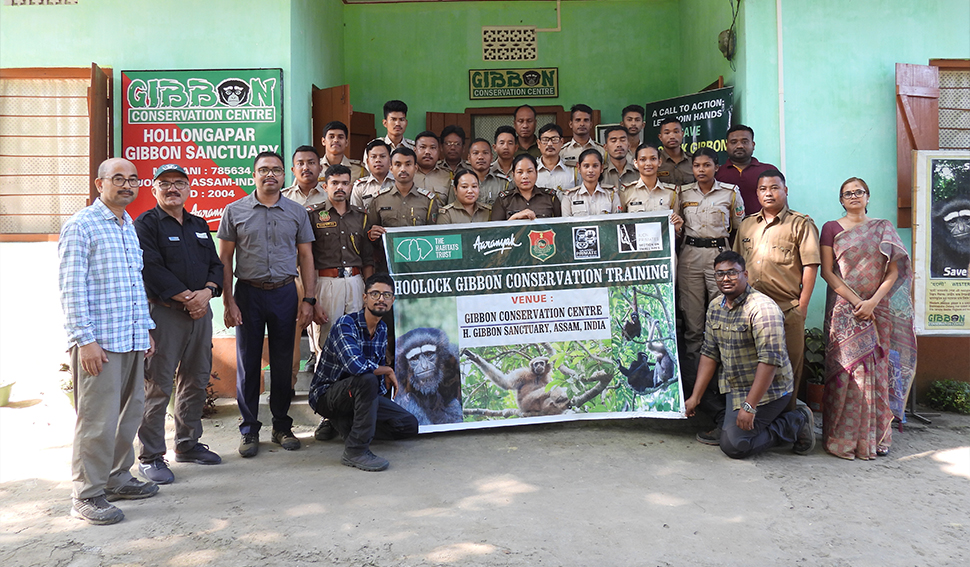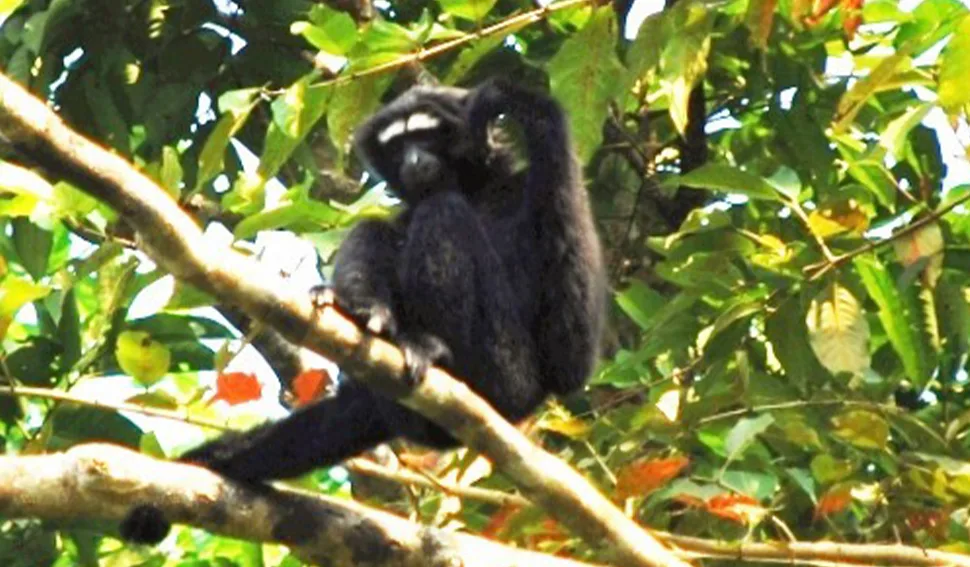Conservation training for Hoolock gibbon continues in Assam

The Western Hoolock gibbon (Hoolock hoolock), the only ape species in India, is indeed confined to the lush forests of Northeast India, primarily on the southern bank of the Dibang–Brahmaputra River system. This rare primate faces severe threats from hunting, habitat encroachment, and fragmentation, exacerbated by limited public awareness and knowledge gaps among newly inducted Assam Forest Department personnel.
To address this, Aaranyak, a leading biodiversity conservation organization in the region, took a proactive step by organizing a training program titled “Training of Forest Frontline Staff for the Conservation of Hoolock Gibbon in Assam.” This initiative, held in partnership with the Jorhat Forest Division of the Assam Forest Department and supported by The Habitats Trust and the IUCN Primate Specialists Group, focused on equipping frontline forest staff with essential skills and knowledge for gibbon conservation.
Through this program, Aaranyak aims to strengthen conservation efforts, promote awareness, and enhance the capacity of forest personnel, which is vital for ensuring the survival of this threatened species in its native habitat.
The week-long residential course covered a wide range of topics — Northeast India biodiversity and conservation, primate conservation with a focus on Hoolock gibbons, census techniques, data collection, habitat restoration, population and habitat monitoring, rescue and rehabilitation techniques, GPS usage, and wildlife law applications.
The programme combined lectures and practical field exercises to introduce the participants to key principles in primatology and field research methods. The trainees also participated in the celebration of International Gibbon Day on 24th October in Meleng Saiding LPS. The trainees were provided study materials, including training manuals, books on gibbon, posters, stickers and group photographs.
The fifth training session in 2024 began on October 21 at the Gibbon Conservation Centre in Hoolock Gibbon Sanctuary, Mariani, Assam. Dr Dilip Chetry, a senior primatologist and Head of the Primate Research & Conservation Division at Aaranyak, inaugurated the session. He emphasised the importance of hands-on training and urged the trainees to implement the learning experiences from the training programme. Dr Chetry thanked the Jorhat Forest Department for their support and cooperation in the successful implementation of the programme.
Twenty-two frontline staff from eleven Assam Forest Divisions, including Cachar, Dima Hasao East, Dima Hasao West, Golaghat, Hailakandi, Hamren, Karbi Anglong East, Karbi Anglong West, Sivasagar, South Nagaon, and Karimganj participated in this training.
The training featured several experts, including Dr IC Baruah (Assam Agricultural University), Dr Prabal Sarkar (University of Science and Technology Meghalaya), Dr Bhaskar Choudhury (Wildlife Trust of India), Ajoy Kumar Das (Guwahati High Court), Gunin Saikia (former Deputy Conservator of Forest), and Mridu Paban Phukan from Wildlife Conservation & Study Centre, Dr Dilip Chetry, Arup Kumar Das, Akshay Kumar Upadhyaya, Simanta Medhi, Arif Hussain of Aaranyak, trained these forest officials.
On October 27, the training programme concluded with a convocation ceremony chaired by Dr Dilip Chetry. Nandha Kumar, Divisional Forest Officer of Jorhat Forest Division graced the occasion as the chief guest.

Kumar expressed gratitude to Aaranyak for supporting the Assam Forest Department in strengthening the conservation efforts of new frontline staff and requested the trainees to deliver their services with dedication and sincerity to save gibbons in particular and the rich biodiversity.
Rupak Bhuyan, Range Officer, Jorhat Forest Division, also attended the convocation programme and encouraged the participants to discharge their responsibilities in their respective divisions. Dr Chetry extended sincere thanks to the Jorhat Forest Division and the local community. Trainees received study materials and a certificate of participation, marking the successful conclusion of the programme.

Leave a Reply